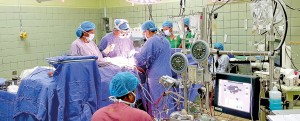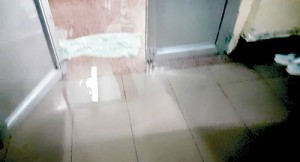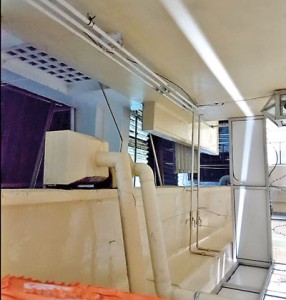News
Heart operations may be suspended from Friday; NHSL theatres contaminated or under repairs
All heart operations, except emergency cases, at the National Hospital of Sri Lanka (NHSL) are likely to be halted by its Cardiothoracic Team on Friday, December 1 due to fears of high infection rates.

A Coronary Artery Bypass operation at the Cardiothoracic Operating Theatre in the main building complex of the National Hospital.
This tragic heart-stopping moment has befallen the NHSL, the premier heart centre of Sri Lanka, as two of its Cardiothoracic Operating Theatres (OTs) are under ‘prolonged’ repair while the other two OTs are allegedly infested with infection, setting off a national crisis, the Sunday Times learns.
An emergency meeting called by NHSL Director Dr. Anil Jasinghe last morning with the Cardiothoracic Team to assure them that the repairs would be concluded by December 15 ended in a stalemate. This was when representatives of the State Development and Construction Corporation informed that the SD&CC would be able to hand back the Cardiology Unit’s Cardiac Surgical Block after repairs only at the end of January next year (2018), it is understood.
As such, the five perturbed Consultant Cardiothoracic Surgeons are due to put down their scalpels in dismay on December 1 as “a last resort” so as not to endanger the lives of their patients requiring open-heart surgery, with the three Consultant Cardiac Anaesthetists joining them.
All open-heart surgeries, except emergency cases, are to be halted on December 1. From that day forth, only emergency heart surgery will be performed, a source told the Sunday Times, this too in an OT borrowed from the NHSL’s Neurotrauma Unit, even though unsuitable for heart surgery.

Floods during the rains at the Cardiac Intensive Care Unit (ICU) -- in the main building complex of the National Hospital -- where there are patients after open-heart surgery. The patients are in danger of serious infection as the water is contaminated with pigeon and crow droppings.
“The Health Ministry authorities who have given scant regard to numerous pleas to put the house in order with regard to the Cardiothoracic OTs must now take the responsibility for deaths of any of the patients,” another source said, adding with emotion that heart patients are “blasting” the doctors even though it is not their fault. The ministry has to take “full responsibility” for this situation, the source added.
A large number of adult patients are dying as heart disease is the No. 1 Killer in the world including Sri Lanka. Among them are fathers who are the breadwinners of young families and mothers with small children. “Regrettably, the doctors have no control over the current situation at the NHSL,” the source lamented.
With the NHSL being the “main provider” of cardiac surgical services for men and women across the country, until 2015 nearly 1,000 major open-heart surgeries were performed at the four Cardiothoracic OTs every year, by the four Heart Surgeons who manned the unit then, it is understood. Two of these Cardiothoracic OTs are located in the main hospital complex along E.W. Perera Mawatha and the other two in the Cardiac Surgical Block of the Cardiology Unit down Kynsey Road.
 Even then there were serious issues in the OTs and it all came to a head in 2014 when it was impossible to continue surgeries. Although the two OTs in the Cardiology Unit’s Cardiac Surgical Block are relatively new, having been opened in 2001, there were problems from the beginning. “They were not up to standard,” the source said.
Even then there were serious issues in the OTs and it all came to a head in 2014 when it was impossible to continue surgeries. Although the two OTs in the Cardiology Unit’s Cardiac Surgical Block are relatively new, having been opened in 2001, there were problems from the beginning. “They were not up to standard,” the source said.
The Cardiac Surgical Block of the Cardiology Unit comprising the two OTs, an Intensive Care Unit (ICU), a High-Dependency Unit (HDU), catheterization laboratories, wards and store-rooms, the Sunday Times learns, was plagued by leakage of both water and sewerage pipes, electrical problems, a poorly-functioning air-conditioning system, pieces of concrete breaking from the building, cracks in the walls, cracked and broken tiles and worst of all fungus in the ICU and corridors and parasitic plants growing on the building.
At the repeated insistence of the Cardiothoracic Team including surgeons and anaesthetists, in November 2014, the Moratuwa University’s Civil Engineering Department was commissioned to survey the Cardiac Surgical Block of the Cardiology Unit. These engineers recommended the immediate closure of the Cardiac Surgical Block and extensive repairs followed by close monitoring annually, to ensure the safety of patients and staff.

A leaking roof just in front of the Cardiac Intensive Care Unit (ICU) housing patients after open-heart surgery in the main building complex of the National Hospital.
However, no action was taken by the Health Ministry until January 2016, sources stressed. It was after several pleas that the contract to repair the four-storey Cardiac Surgical Block of the Cardiology Unit was given to the SD&CC which carried out a survey and requested five weeks each to complete the work on a floor. The work was begun on April 26 last year on the third floor which houses the two OTs and the ICU.
Another source did the calculation and said that it should have taken only 20 weeks (five months) to complete the repairs but work proceeded at snail’s pace.
One year and seven months later the work has ground to a halt with allegations that the Health Ministry was not releasing the funds and the doctors urging the Health Ministry to redress this grave situation, the source pointed out.
With the closure of the two OTs in the Cardiology Unit for repairs, the number of open-heart surgeries had to be slashed by 50% even though by that time there were five Cardiothoracic Surgeons. The expertise and skill are available but not the crucial facilities, the source added.
“Six deadlines — on when the Cardiology Unit’s Cardiac Surgical Block would be handed back after repairs — have been set and broken heartlessly. This is a national crisis, but nobody in the Health Ministry is responding to the ‘deadly’ need of these heart patients,” stressed this source.
The woeful tale of the heart patients is not over. The other two Cardiothoracic OTs and Cardiac ICU in the main hospital complex are also in dire straits and “falling apart”, the Sunday Times understands. The list is long and shocking – the roof is leaking with rainwater contaminated with pigeon and crow droppings pouring into the OTs. The Cardiac ICU has a large kunu kaanuwak (dirty drain) flowing by which overflows frequently and floods this area occupied by patients who have had open-heart surgery. There are also infection-carrying rats scurrying hither and thither in the OTs and the ICU. The central AC is malfunctioning and been substituted by a split-AC which is not suitable.
Explaining the vital need for central AC, sources said that a sterile OT needs to have ultra-clean filtered air sent in by high-efficiency filters and laminar flow. This is essential to prevent high infection rates and high death rates. “We cannot and will not put patients’ lives at risk. It is unethical to do so and that is why we are reluctantly compelled to stop operating,” the sources said.
The number of heart surgeries performed earlier at the NHSL was ‘large’ by any standards for a single unit, another source pointed out, adding that the two other hospitals catering to patients who need heart surgery are the Kandy Teaching Hospital for those in the Central Province and the Karapitiya Teaching Hospital for those in the Southern Province.
Open-heart surgeries were performed over a six-day week, Monday through to Saturday, earlier at the NHSL while also attending to emergency cases as well as trauma and accidents, sources said. The Health Ministry’s Annual Health Bulletin itself gives a figure (available for 2015) of 30 deaths per 100,000 due to ischaemic heart disease. This is without taking into consideration heart failure, cerebrovascular disease, pulmonary heart disease, valvular heart disease and congenital heart disease.
Now thousands of patients are on the NHSL’s long waiting list and sometimes when they are called to be told that a date has been fixed for their open-heart surgery, the answer is that the patient is dead and even the one-year or three-month alms-giving has been given. Some relatives, of course, in their sorrow spew out rank filth against the doctors, blaming them, a source said.
The source added that while the patients are on the waiting list, their condition worsens and their hearts get weaker, increasing illness and quickening death.
| Director says Cardiology Unit theatres will be ready by Dec 15 The deadline for the State Development and Construction Corporation (SD&CC) to handover the repaired Cardiac Surgical Block of the Cardiology Unit is December 15, assured NHSL Director Dr. Anil Jasinghe when contacted by the Sunday Times on Friday.This decision was taken by Health Minister Rajitha Senaratne in consultation with Minister Sajith Premadasa who is in charge of the SD&CC, and SD&CC officials on Friday, Dr. Jasinghe said. The repairs to the four-storey Cardiac Surgical Block had been estimated to cost Rs. 186 million. “As soon as we get the Cardiology Unit’s Cardiac Surgical Block back after repairs, we will begin repairs on the OTs located within the main hospital complex,” he said, pointing out that the use of the Neurotrauma OT can be continued by the Heart Surgeons. | |

